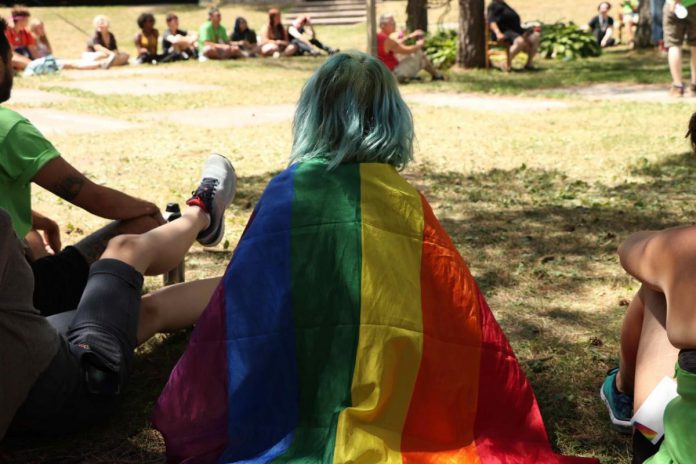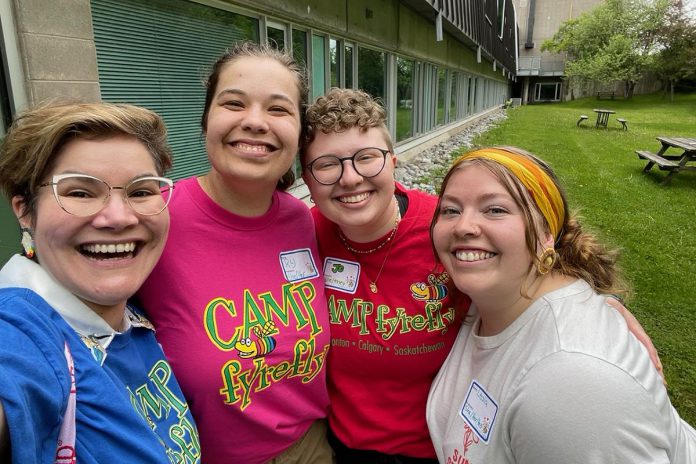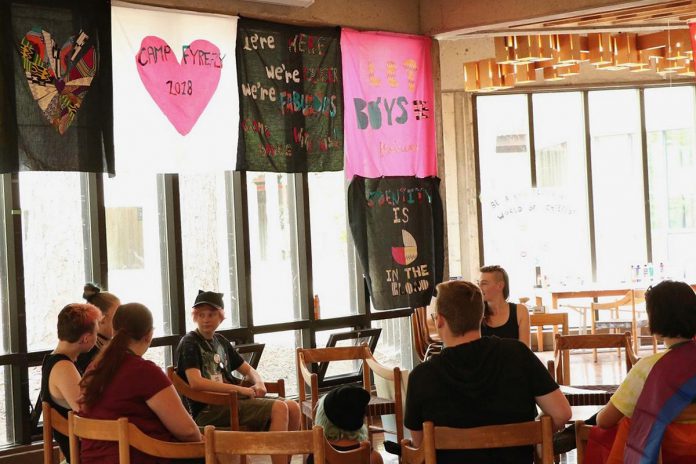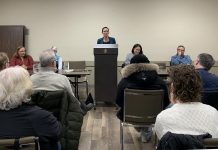
Being a teenager is a trying time for anyone, but that’s especially true for those who struggle to find a community of peers who share their experiences.
At Camp fYrefly, 2SLGBTQIA+ youth are finding their communities while being authentically and unapologetically themselves.
With the Ontario chapter held at Trent University in Peterborough every August, Camp fYrefly is Canada’s only national leadership retreat for lesbian, gay, bisexual, trans-identified, two-spirited, intersexed, queer, questioning, and allied youth.
Through guided workshops, leadership opportunities, and the potential for meaningful, lifelong friendships, the four-day overnight camp is a transformative, enlightening experience that has the chance to save lives.
“Just looking through the applications from campers, there are a lot of folks who have mentioned the need for finding community and building lifelong friendships in and around the area,” says Jo Currie, a camp coordinator for the 2025 event. “Building those communities is something that is positive and, for some, it’s extremely necessary to find community that they can relate to and grow with, and explore themselves and figure out who they are and where they sit within their community.”
Camp fYrefly was founded in 2004 by Dr. André P. Grace and Dr. Kristopher Wells at the University of Alberta. After seeing its impact while serving as the artist in residence at the Edmonton Camp, Peterborough artist, activist, and educator Dr. Spencer J. Harrison brought Camp fYrefly to Trent University in 2017.
This year, the camp will be held at the university from Thursday, August 7 to Sunday, August 10.
VIDEO: About Camp fYrefly with Dr. Spencer J. Harrison (2018)
Over four days, with Trent student residences as the home base, youth aged 13 to 21 will be immersed into various activities and workshops, many of which are arts-based, led by youth leaders and artists who live in and around Peterborough. From campfire sing-alongs to swimming at the pool, and a final showcase for new friends to show off their talents, the weekend offers a myriad of opportunities for youth to make strong connections with their peers.
“Everyone’s going to have to try to push boundaries (because) meeting new people is very scary,” says Reilly Lafreniere, another 2025 camp coordinator. “They’re going to learn how to manage their time and how to push themselves. Those workshops are going to be touching on those skills too, so they’re going to be learning how to do it not just in theory but in practice by connecting with people and learning how to support each other — which is a huge part of leadership.”
Youth will be divided into “pods” with a volunteer youth leader acting as their first point of contact. In addition to adult volunteers to mentor the pod leaders, teacher candidates will be using the inclusive camp as an alternative placement setting where they will facilitate discussions and also mentor and connect with the youth.
For the camp’s faculty liaison, Dr. Rachael Nicholls, who has been involved since the camp first came to Ontario, it’s not just the campers who learn and build resilience over the course of the weekend, but leaders often learn from the younger generations as well.
“I myself have experienced and found the courage in the freedom that the youth have,” she says. “Their language and the way they’re expressing themselves is much more than I could have imagined at that age, and so to see them so joyful and really embracing who they are earlier than I did is rewarding. It’s been really powerful to see this kind of intergenerational support and building each other up towards incredible leadership.”
As for Currie, who is currently a student in Trent University’s Bachelor of Education program, she says she’s looking forward to this opportunity to learn from the campers as it will help her connect with students in the future.
“I think that will better me as a future educator, because I want to go into the world of teaching being as authentically myself as I can,” she says. “Me being myself and showing up as I am helps kids do the same.”

The group already had the chance to learn from today’s youth when Camp fYrefly hosted the first GSA (Gay-Straight Alliance) Conference on campus and invited local school boards to attend for a day with mini-keynote addresses, workshops, and tours.
“It was just incredible to meet some of the youth and hear about the cool things that they are doing and we felt really inspired by them,” Dr. Nicholls says. “It allowed them to meet each other. Maybe your people aren’t at your high school, but maybe they are at a high school just down the road, so you can connect with folks that are also local to Peterborough.”
During the conference, the leaders asked the youth what they wanted their GSAs to be doing. Along with listing some key initiatives, one person said they wanted to make a friend.
“It just stopped me, and someone from across the room at a totally different school said, ‘I’ll be your friend,'” Dr. Nicholls recalls. “It’s those moments really that I’m hoping for (at Camp fYrefly). That really means so much to have good people and have somebody that would say, ‘I’ll show up for you, I will be your friend’ when you’re feeling like you don’t have any.”
Though camp coordinators Currie and Lafreniere grew up in Ottawa, with both saying they had a positive experience figuring out their own identities and building community, they recognize that Peterborough is a smaller community that may not have the same opportunities for 2SLGBTQIA+ people to find their support systems.
“Having those campers have a sense of ‘There are people like me, there are people who want to support me, there are people in my corner. Even if I don’t see them every day, people are out there, and I matter,'” says Currie about her goals for the camp. “If campers walk away feeling more supported and more loved than when they came in, then we’ve done our job.”
“Even just in starting to work here, I’ve become aware of so many programs around Peterborough and so many different groups that are very, very willing to help,” adds Lafreniere. “So even just letting campers know that those supports also exist will be really nice because of course the connections and friendships they’re building are great, but so is knowing that there’s resources they can access to help them further.”

As Camp fYrefly Ontario goes into its ninth season this year, Dr. Nicholls says she has seen the life-changing effect the camp can have, with some campers having gotten married, while others who have gone on to complete their studies at Trent University and others who have found a new passion and interest in an art form.
“We have folks that share that camp transformed their families — and the family didn’t come to camp,” she says. “The camper could understand themselves and articulate it and it transformed the way that they interact as a family, which is incredibly beautiful. We have campers that say the camp saved their lives … coming to camp and meeting other folks like them, feeling less alone in his world — it changed the story for them.”
Given how life-changing it can be, Camp fYrefly makes being being accessible to the community a priority. Though running the camp costs $1,000 per camper, they are only charged $300, with bursaries available for those who need financial support. This is made possible by volunteers who diligently fundraise year-round.
If you want to support Camp fYrefly and help remove financial barriers for campers, donate at momentous.trentu.ca/campfyreflygive.


























